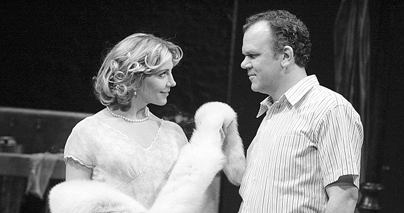Natasha Richardson, John C. Reilly both brilliant, if oblique
Nothing sucks the life out of a play as quickly as rendering it sacrosanct. Tennessee Williams’ plays––or film versions of them—are familiar to many theatergoers, and past iconic productions are the stuff of folklore, if not direct experience. Consequently, with seats to fill, Broadway revivals are all too likely to treat Williams reverentially.
The playwright seemed to want that, if accounts from his writers and others who remember working with him can be believed. Yet as long as theater remains a living art, one can hope that directors will challenge convention—and take the kind of risks so rare on Broadway today.
The risk is why David Leveaux’s decidedly anti-lyrical production of “The Glass Menagerie,” featuring one of the under rated performances of the year by Christian Slater, and Edward Hall’s production of “A Streetcar Named Desire,” starring Natasha Richardson as Blanche DuBois and John C. Reilly as Stanley Kowalski, are theatrical and largely exciting, even if imperfect.
In “Streetcar,” Hall has graphically depicted Blanche as an end-stage alcoholic and guided Richardson into a performance often raw and technically brilliant. From her first entrance, Richardson’s Blanche appears to be one drink away from the DTs. It is as believable a portrayal of alcoholism as I have ever seen—and of denial on the part of her sister Stella played by Amy Ryan—that makes Blanche’s descent into dementia completely riveting.
This concept for Blanche, however, doesn’t serve the play, for in rendering clinical truth, the production abandons the character’s poetry that is co-equal with her illness in making Blanche so fascinating. “Streetcar” is not a play about the costs of addiction; it is about the violent, if necessary stripping away of illusion. It is about the denied and suppressed animal passions that beat in all of us that drive us to love “inappropriately” and commit all kinds of acts that our higher natures and social conditioning would forbid. It is about the romances we spin to maintain an idealized image, regardless of the truth and how the animal passion nearly always wins.
“Streetcar” is about how the removal of cultural structures reveals our baser nature. By being so precisely naturalistic in her performance, compelling to a fault, Richardson’s choices undermine the play. The central conflict over the aristocratic artifice, a relic of a past lost in a changed world, which Blanche struggles to impose on her sister Stella’s squalid yet passion-rich life with Stanley has been lost. In this production, we see only the terrible cost exacted on Blanche and her collapse and not the subtler, yet equally tragic, loss of Stella who, having indulged completely in her animalistic urges, puts poetry out of reach for herself forever.
That is recognition Stella must gain as she watches Blanche being forcibly removed to the mental hospital, but Ryan only seems relieved that she can return to her life of indulgence with Stanley. She is oblivious of the cost of that life. Williams wrote two tragedies, but Hall has given us only one and ultimately done a disservice to the playwright.
John C. Reilly is a wonderful choice for Stanley. Any woman would fall for Marlon Brando—who played Stanley both on stage and on film––follow him to a crumbling shotgun flat and put up with almost any level of abuse if that was the cost of being with him. Reilly’s appeal is not so movie-idol obvious, but he plays the part with a smoldering under-the-surface sensuality that give us clear hints of why Stella fell for him, even if it’s not the choice we would make for ourselves.
Ryan’s Stella is full and heartfelt, even if she never experiences her character’s final tragedy.
Chris Bauer as Mitch, Stanley’s friend who almost falls for Blanche, gives one of the best performances of the production, finding every nuance in the role—his conflict, his loss and ultimately his impotent rage. Mitch’s delusion is that through Blanche he can bridge the gap between the base reality of his life and his dream of something higher. It is a third, smaller tragedy of the piece.
Robert Brill’s set perfectly captures the rundown world of the play as do William Ivey Long’s costumes. Donald Holder’s lighting alternates between the oppressive heat and scant cooling and feels like New Orleans in the summer.
There is much here to recommend this “Streetcar” in the performances and the design, but as far as a definitive production of a masterpiece, it leaves one disappointed and wanting much more.
gaycitynews.com
































